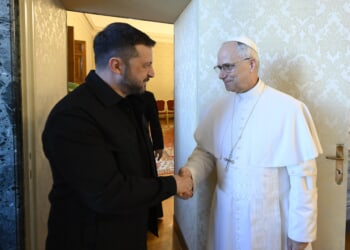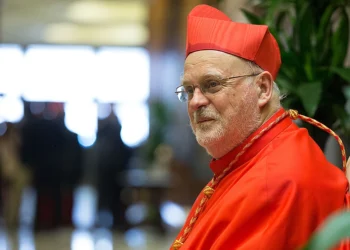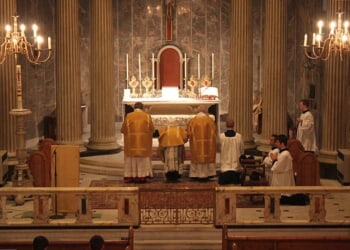Sir Andrew Mitchell is a former Deputy Foreign Secretary, Shadow Foreign Secretary and MP for Sutton Coldfield.
What follows is a diary of a recent parliamentary trip to the Falklands. This weekend marks the anniversary of hostilities ending in the argentine surrender in the South Atlantic.
“The long journey to the Falkland Islands from Royal Sutton Coldfield passes through RAF Brize Norton, the airbridge and RAF Ascension islands, briefly the busiest airfield in the world, during the Falklands war.
I am keen to inspect the major runway repair in which I became involved as DfId secretary, ten years ago. It cost over £200 million split equally between the UK and the US. At 10,000ft it is the reserve runway for the space shuttle.
We must hope nobody tells Sir Keir Starmer about this crucial military gateway to the south Atlantic: Strategically placed, with no indigenous population, hundreds of miles from anywhere, tropical, a vital US-UK military facility.
How long can it be before our prime Minister offers to give it to Gabon with a bung of £9 billion and a one-hundred-year lease?
We are guests of the Falkland Islands government, we four recess-abandoning MPs – a broad cross section of the House of Commons with Jamie Stone – the Laird of Tain – an impossibly grand liberal democrat (think Joe Grimond and the whigs rather than sandals and muesli.) Seamus Logan ( SNP) recently elected at the age of 67 and a walking example of the benefits of late entry into parliament armed with life experience rather than those research assistants/special advisers and professional politicians who clutter the place up, and Richard Baker ( Labour ) steeped in Scottish labour politics and the caring services and myself !- Described by the Falkland’s government as a “Tory Grandee” which as everyone knows means “an aging old Tosser on the way out.”
We are joined on the flight by twelve new MPs taking part in the Parliamentary Armed Forces scheme – the cream of the new parliamentary intake – accompanied by the stern and imposing figure of a former government whip who is there to ensure good behaviour and who passes the long flight lugubriously calculating which party has more to lose from the subsequent by-elections if the plane goes down.
The weekend after the Falkland’s were invaded Parliament was recalled for an unusual Saturday session where Michael Foot, the leader of the opposition spoke so powerfully in support of the Falkland Islands.
I remember an old friend, a clerk, in the House of Commons ringing me to say that there was no possibility of recapturing the islands and we’d have to do the best we could through negotiation. At that point he had not had the opportunity to meet Mrs Thatcher.
Leona Roberts the “Prime Minister” of the Falklands runs a tight ship and Alison Blake is the adored Governor.
And she wears the uniform of Navy broadcloth – court dress in 1937 – with the feathers and the bicorn hat and governor’s sword; handmade black leather dress boots and around the neck and cuffs the oak leaves and acorns – a sight unrivalled throughout the anglosphere/overseas territories with the governor of Bermuda a remote second in his tropical white governor’s uniform.
Once the war was over, some lowlife in an early example of political correctness decided that the governor should henceforth be known as the Overseas Administration Executive. Rex Hunt was having none of it. The row went all the way up to the Prime Minister with Mrs Thatcher adjudicating and writing in blue pen on the foreign office submission “No! Let him have the title; they’ll call him “Governor” anyway!”
Statues and tributes to Mrs. Thatcher are everywhere. I enjoyed drinking Iron Lady beer with my non-Tory colleagues. We visited the port Stanley cathedral where Lieutenant Alistair Bruce fought on tumbledown with the Scots Guards and then spent three days and nights with his sleeping bag bunked down beside the cathedral organ repairing it from the damage gratuitously inflicted by Argentinian soldiers.
Today, the Falkland Islands are riding high, with GDP at around £280 million per year and £84,000 per head. The economy transformed by revenues from the fishing industry with a strong likelihood of hydrocarbons turning the islands into the Switzerland of the South Atlantic.
Guarded by the Tri service Mount Pleasant base, typhoons, a company of Gurkhas and the guard ship HMS Forth and a protective array of surface to air missiles the optimism index is sky high. While low flying military aircraft attract complaints in the UK here in the Falklands concern is expressed if these magnificent aircraft don’t screech past Port Stanley at just above wave level.
Along with my colleagues I laid a wreath at the Liberation monument on behalf of the Royal Town of Sutton Coldfield. But the most moving memorial is at San Carlos waters, an impossibly beautiful place which 43 years ago witnessed the sound and fury of the British military landing. In the cemetery there lie the remains of men so young who gave their lives, some of whose parent’s ashes were subsequently interred with them.
It was impossible not to shed a tear as we honoured their bravery and sacrifice. We traversed Goose Green in our vehicles and met sprightly veterans visiting terrain over which they had yomped all those years ago.
And we went to the Islands Secondary school to meet the bright-eyed new generation of Falkland Islanders, their faces filled with the optimism those veterans had secured for them and twinned the school with the Royal Sutton Coldfield schools debating competition taking place in a few weeks’ time.”


![Former Bravo Star Charged After Violent Assault Using a Rock-Filled Sock in Tennessee Walmart [WATCH]](https://www.right2024.com/wp-content/uploads/2025/07/Former-Bravo-Star-Charged-After-Violent-Assault-Using-a-Rock-Filled-350x250.jpg)




![Karoline Leavitt Levels CNN's Kaitlan Collins and Other Legacy Media Reporters [WATCH]](https://www.right2024.com/wp-content/uploads/2025/07/Karoline-Leavitt-Levels-CNNs-Kaitlan-Collins-and-Other-Legacy-Media-350x250.jpg)
![Man Arrested After Screaming at Senators During Big Beautiful Bill Debate [WATCH]](https://www.right2024.com/wp-content/uploads/2025/06/Man-Arrested-After-Screaming-at-Senators-During-Big-Beautiful-Bill-350x250.jpg)

![Illegal Alien Walked Free After Decapitating Woman, Abusing Corpse for Weeks [WATCH]](https://www.right2024.com/wp-content/uploads/2025/07/1753013138_Illegal-Alien-Walked-Free-After-Decapitating-Woman-Abusing-Corpse-for-350x250.jpg)






